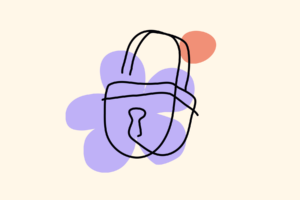The Unlock DAO is a decentralized autonomous organization (DAO) that governs the Unlock Protocol. The DAO is comprised of members who are holders of any amount of Unlock DAO Token (UDT). The Unlock DAO is responsible for making decisions about the future of the Unlock Protocol, such as which features to add, how to improve the user experience, and how to allocate funds from the DAO’s treasury.
The Unlock DAO is a way for the Unlock community to have a say in the protocol’s future. By holding UDT and voting on proposals — or delegating those votes to others in order to vote on their behalf — UDT holders can help shape the direction of the Unlock Protocol.
Proposals can be about anything that affects the Unlock Protocol. As noted above, these proposals and decisions can span a wide variety of topics, such as changes to the protocol’s code, the addition of new features, or the allocation of funds.
By holding UDT and voting on proposals, UDT holders and delegates can help ensure that the Unlock Protocol meets the needs of the community and is set up for a sustainable future.
How is voting handled in the Unlock DAO?
There are two types of votes that take place in the Unlock DAO, off-chain votes and onchain votes. Both types of votes can be voted on by anyone who holds any amount of UDT or who has had votes delegated to them in order to vote on a UDT-holder’s behalf.
There are pros, cons, and differences between each type of vote.
Off-chain votes
- Are typically proposed, managed, and voted on through Snapshot.org
- Are “gas-less” and do not cost any on-chain gas to vote or propose
- Can be voted on by anyone who holds any amount of UDT or anyone who has had votes delegated to them on Snapshot
- Off-chain votes are not automatically executed after the voting period closes if the vote passes — instead, someone else, a third party, needs to execute the decision of the off-chain vote
Onchain votes
- Are typically proposed, managed, and voted on through Tally.xyz, and managed by the Unlock Protocol Governor smart contracts
- Require payment of “gas” in order to vote to execute the voting transaction onchain
- Require some level of technical knowledge around smart contracts in order to create a proposal to craft the code or terms that will autonomously execute if the vote passes
- Since these proposals automatically execute if passed, they need to be reviewed very carefully to prevent unintended consequences
- Can be voted on by any holder of UDT who has had votes delegated to them onchain
Note: If you want to delegate your votes to someone for both off-chain and onchain votes, you will need to delegate in both of those areas. Delegation in one area (e.g. for onchain votes) does not automatically also delegate votes for off-chain votes. The two need to be delegated separately.
What is delegation?
In the context DAOs in general, and in the context of the Unlock DAO in particular, delegation refers to the act of granting voting power to an individual. Delegation allows someone to transfer their voting rights to someone else whom they trust to make decisions on their behalf.
Delegation is an essential feature in DAOs because it can enable more efficient decision-making and participation in the governance of the DAO.
Here are a few reasons why delegation matters:
- Efficiency and expertise: Delegation allows individuals to transfer their voting power to those with expertise or a deep understanding of specific issues. Not everyone may have the time, knowledge, or resources to make informed decisions on every matter within a DAO. By delegating their voting power to knowledgeable participants, individuals can leverage the expertise of others to make more informed decisions.
- Active participation: Delegation encourages broader participation in DAO governance. In large decentralized organizations, it may be challenging for all members to stay actively engaged in every decision. Delegation allows members to select trusted individuals who can represent their interests and preferences in voting processes. This way, even those who are less involved or lack expertise can still contribute to decision-making.
- Scalability: As DAOs grow in size and complexity, delegation becomes increasingly important. With a large number of participants, it may be impractical for every individual to actively participate in every decision. Delegation helps scale decision-making by allowing individuals to distribute their voting power and focus on areas of specific interest or expertise.
- Flexibility and adaptability: Delegation can be dynamic and flexible. Participants can change their delegate at any time, allowing them to adjust their representation according to their evolving preferences or changes in the expertise of delegates. This flexibility ensures that decision-making within the DAO remains responsive and adaptable.
Delegation separates the holding of voting power (in the Unlock DAO’s case, those who hold UDT) from the actual voting that is done with that voting power. UDT-holders can choose to cast their own votes, or can delegate that voting power to a trusted individual who will vote on their behalf.
What is self-delegation?
For active participants in the DAO, self-delegation is the mechanism used in order to vote one’s own shares in onchain votes. Votes must be delegated in order to vote onchain. If you plan on voting onchain, you need to delegate your votes to yourself in order to vote on onchain proposals. Only delegated votes can be voted.
The act of delegating voting power to oneself is referred to as self-delegation.
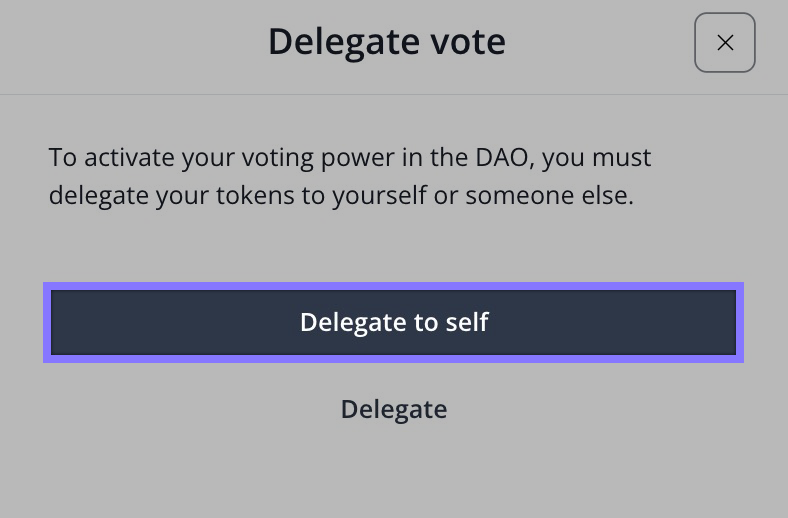
ACTION REQUIRED: If you wish to vote your own UDT in an onchain vote, be sure to self-delegate your votes. Here is how to self-delegate onchain votes using Tally.
I want to have a say in the Unlock DAO, but I’m not always able to vote — what can I do?
This is the perfect use case for delegation and delegating your votes to someone else. If you want to have a say in the Unlock DAO, but don’t feel you have the time or ability to keep up with ongoing off-chain and onchain proposals and their related conversations and votes, you can delegate your votes to someone who will vote them on your behalf.
What are the traits of a good delegate?
Choosing a good delegate involves considering various factors. While the specific traits of a good delegate may vary depending on the context and individual preferences, here are some general traits to consider:
- Expertise and knowledge: A good delegate should have a strong understanding of Unlock Protocol, as well as the Unlock DAO and governance processes.
- Alignment of values: Look for a delegate whose values align with yours or represent your interests. A delegate who shares your vision, goals, and principles is more likely to make decisions that reflect your preferences.
- Reputation and trustworthiness: Consider the delegate’s reputation and track record within the community. Look for individuals who are trusted and respected by their peers. A good delegate should have a history of acting in the best interests of Unlock Protocol and the DAO.
- Responsiveness and communication: It’s important to choose a delegate who is responsive to inquiries, open to feedback, and communicates effectively. They should be accessible to answer questions and provide updates on their voting decisions or rationale.
- Consistency and reliability: Look for delegates who consistently participate in voting and engage actively in the Unlock DAO’s governance processes. A good delegate should demonstrate a reliable commitment to their role and the responsibilities associated with it.
- Performance and engagement: Review the delegate’s voting history and engagement in previous proposals. Assess their level of involvement, attendance in governance discussions, and the quality of their contributions.
- Transparency: A good delegate should be transparent about their voting decisions and provide clear justifications for their choices. They should be willing to disclose their voting record and engage in open dialogue with delegators.
Note: You may consider diversifying your delegation choices to reduce concentration of power and promote representation within the DAO. Distributing your delegation across multiple delegates can help ensure a broader range of perspectives and mitigate potential risks.
Ultimately, the choice of a delegate is a personal decision that depends on your specific priorities, preferences, and context of the decision. It’s advisable to conduct thorough research, engage with the community, and consider multiple perspectives before making your delegation decision.
How do I delegate my votes for off-chain votes in Snapshot?
Note: If you want to delegate for both off-chain and onchain votes, you will need to delegate in both of those areas. This section is on how to delegate your votes for off-chain votes that may take place in Snapshot.
Offchain votes are often used for “temperature checks” and to get the pulse of the community before potentially taking the next steps to commit to an onchain vote.
To delegate your votes for off-chain votes in Snapshot, follow these steps.
Decide on your delegate
Know who you want to delegate to. Before proceeding, know the wallet address of the individual you wish to delegate your off-chain votes to. Double check the wallet address.
Make sure there is a small amount of ETH in your wallet to pay for one transaction
While voting with Snapshot is gas-less, there is a one-time transaction required in order to confirm the delegation itself on chain. This will likely cost a small fraction of an ETH (as low as 0.001). Make sure you have a little bit of ETH in your wallet to confirm the delegation transaction.
Go to Snapshot and connect your wallet
Go to https://snapshot.org/#/delegate and connect your wallet.
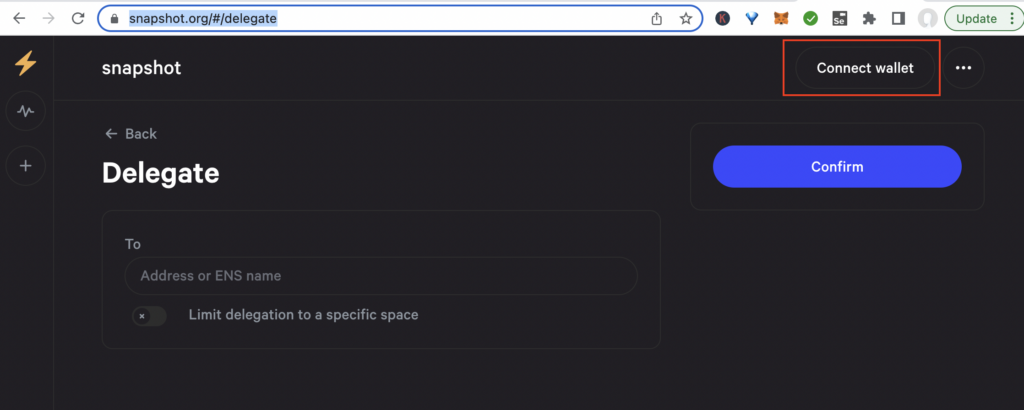
Limit the delegation to just the Unlock DAO
Unless you specify it, Snapshot assumes you want to delegate all your voting power across multiple DAOs when you perform a delegation. You’ll want to limit this delegation to just votes in the Unlock DAO.
To do this, select the “Limit delegation to a specific space” option, and type in unlock-protocol.eth, which is the name of the Unlock DAO’s space in Snapshot.
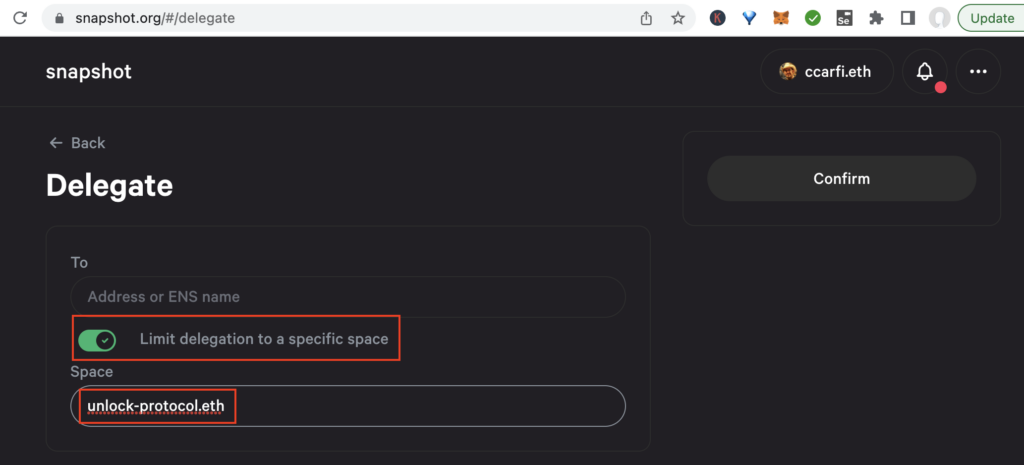
Paste in your delegate’s wallet address
Now, paste in your delegate’s address, double-check everything, and hit Confirm. You’ll be prompted to confirm the transaction in your wallet, and you will have delegated your off-chain votes!
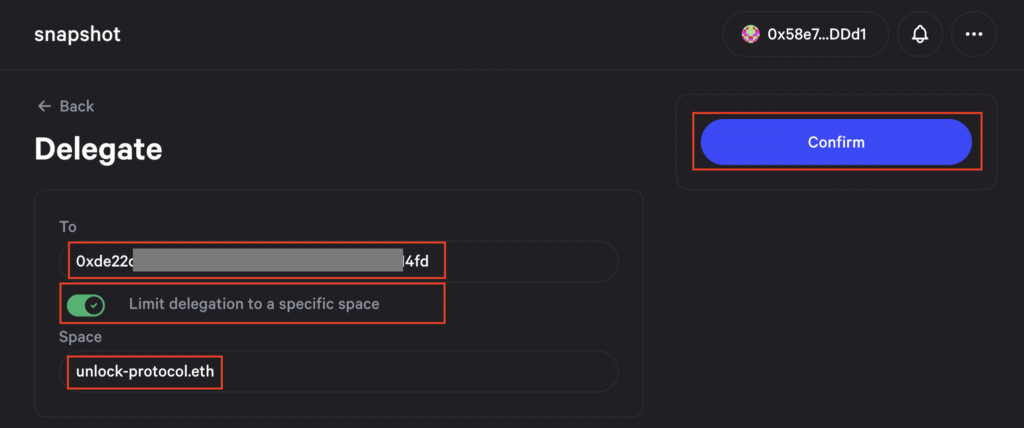
Changing your mind and removing a Snapshot delegate
Delegation is not forever. If at any time you want to remove your delegation, go to the https://snapshot.org/#/delegate page and click the x next to the delegate you want to remove. Like performing the initial delegation, this will require a small amount of gas to confirm the removal via confirming an onchain transaction.
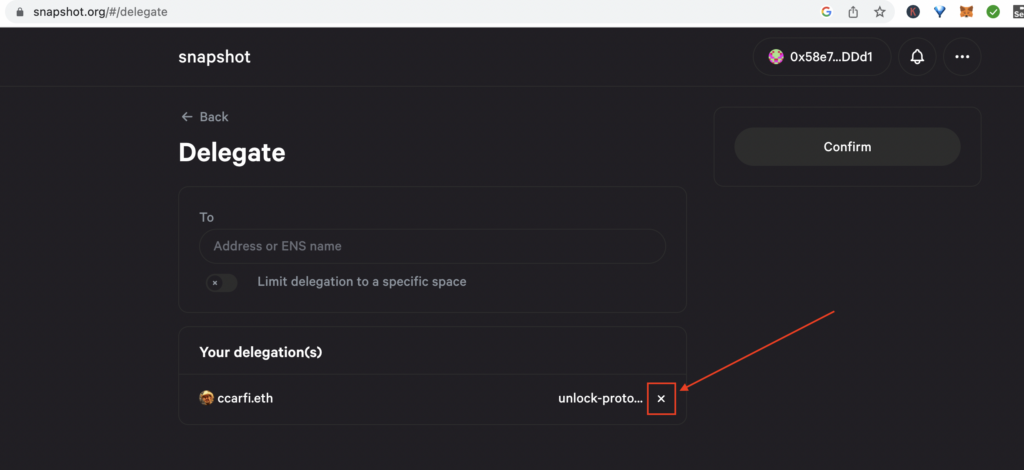
How do I delegate my votes for onchain votes in Tally.xyz?
Note: If you want to delegate for both off-chain and onchain votes, you will need to delegate in both of those areas. This section is on how to delegate your votes for onchain votes that may take place in Tally.xyz.
REMINDER: You must set up delegation if you want to participate in governance votes, even if you are self-delegating and performing those votes yourself.
This section is copied from the original source in Tally’s docs at: https://docs.tally.xyz/knowledge-base/proposals/delegating-voting-power
To delegate your votes for onchain votes in Tally.xyz, follow these steps.
Decide on your delegate
Know who you want to delegate to. Before proceeding, know the wallet address of the individual you wish to delegate your onchain votes to. Double check the wallet address.
Make sure there is some amount of ETH in your wallet to pay for the delegation transaction
There is a transaction required in order to confirm the delegation itself onchain. Make sure you have a little bit of ETH in your wallet to confirm the delegation transaction.
Go to Tally.xyz and connect your wallet
From the https://www.tally.xyz/gov/unlock DAO Page, select the Delegate vote button.
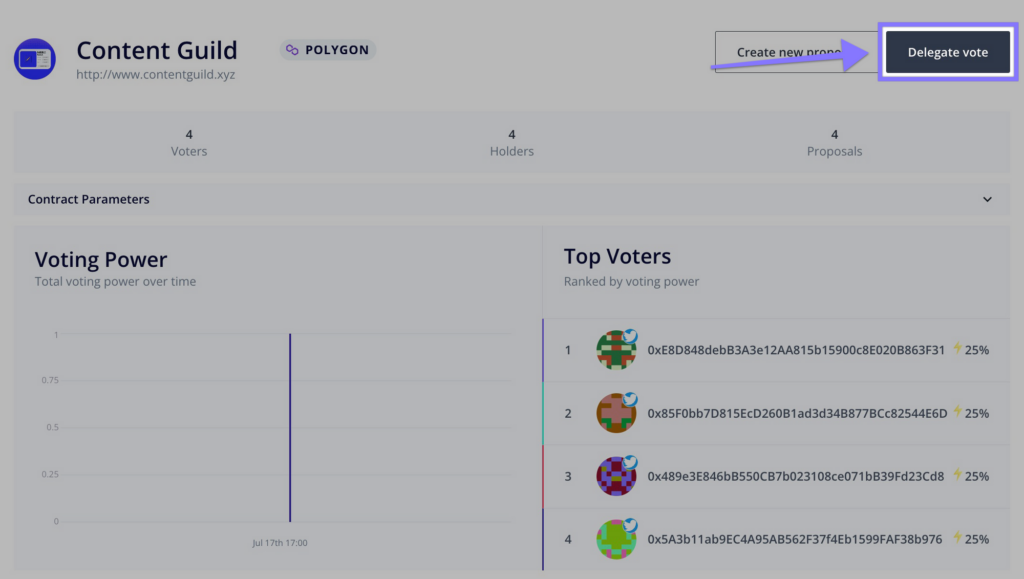
In the pop up window, select Delegate.
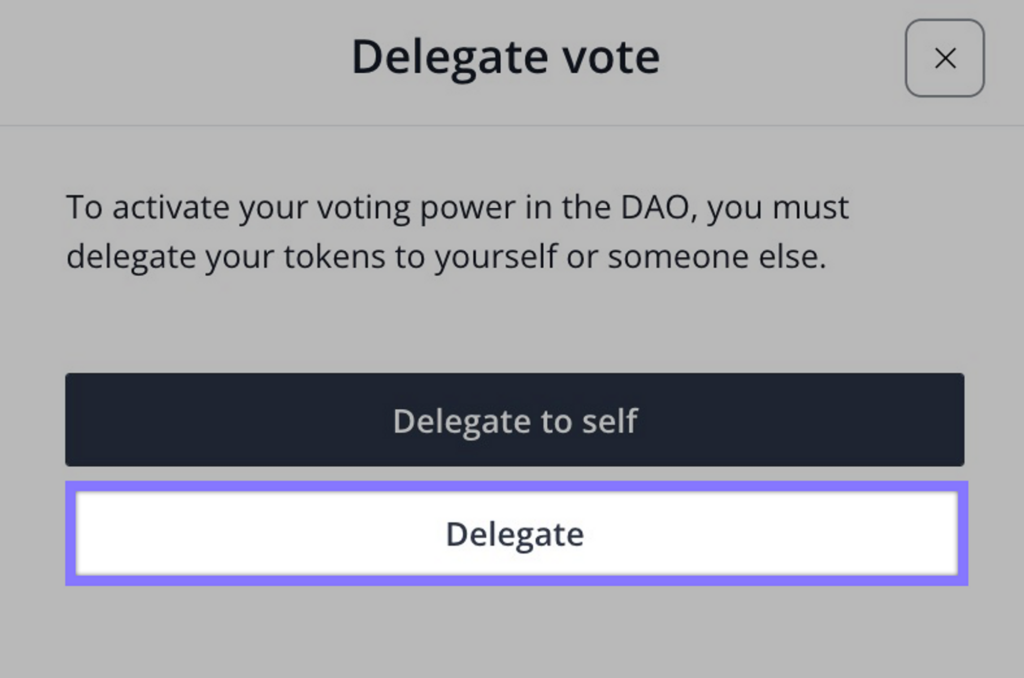
Enter your delegate’s address
Enter the Delegate address you want to delegate your voting power to, then click Delegate votes.
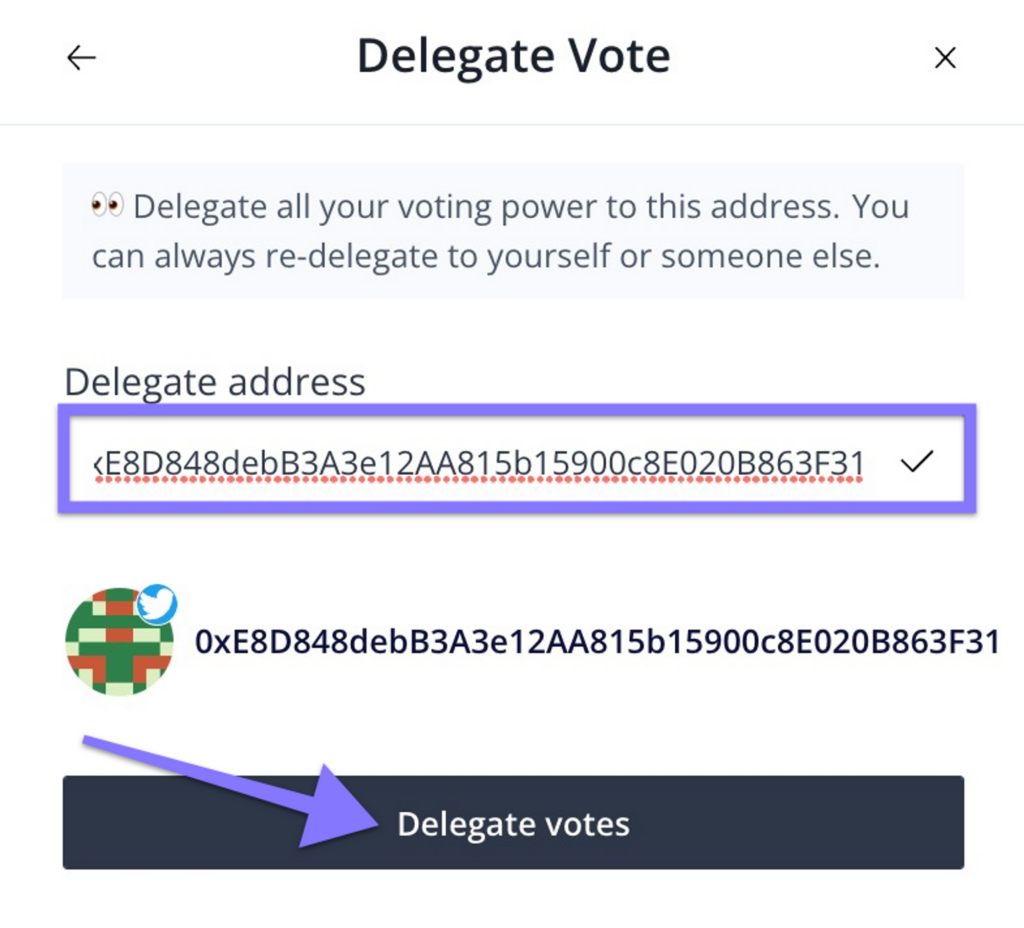
Confirm and sign the transaction
Confirm and sign the transaction via your wallet (the example below shows MetaMask).
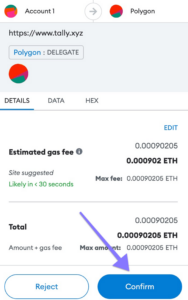
Confirm the delegation
Navigate to your profile page by clicking your profile name at the top right and selecting Profile from the drop-down.
Select the DAO button for the delegation you wish to confirm. You’ll see your delegation status at the far right of the Activity section.
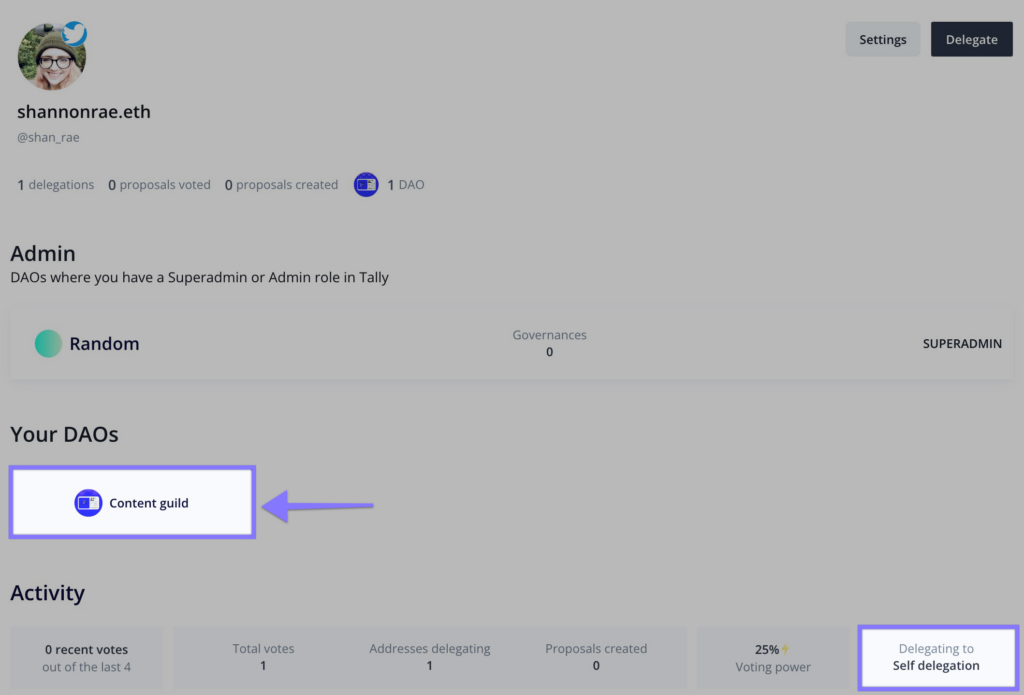
Wrapping up delegation
Delegation is an important concept for all DAOs, and the Unlock DAO is no exception. If you have any questions about how to delegate your votes for off-chain or onchain governance activities in the Unlock DAO, please reach out in the #governance channel in Discord.




